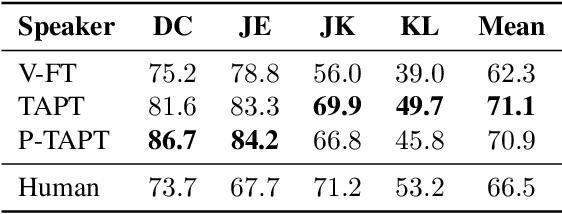Exploring Wav2vec 2.0 fine-tuning for improved speech emotion recognition
Paper and Code
Oct 28, 2021



While wav2vec 2.0 has been proposed for speech recognition (ASR), it can also be used for speech emotion recognition (SER); its performance can be significantly improved using different fine-tuning strategies. Two baseline methods, vanilla fine-tuning (V-FT) and task adaptive pretraining (TAPT) are first presented. We show that V-FT is able to outperform state-of-the-art models on the IEMOCAP dataset. TAPT, an existing NLP fine-tuning strategy, further improves the performance on SER. We also introduce a novel fine-tuning method termed P-TAPT, which modifies the TAPT objective to learn contextualized emotion representations. Experiments show that P-TAPT performs better than TAPT especially under low-resource settings. Compared to prior works in this literature, our top-line system achieved a 7.4% absolute improvement on unweighted accuracy (UA) over the state-of-the-art performance on IEMOCAP. Our code is publicly available.
 Add to Chrome
Add to Chrome Add to Firefox
Add to Firefox Add to Edge
Add to Edge